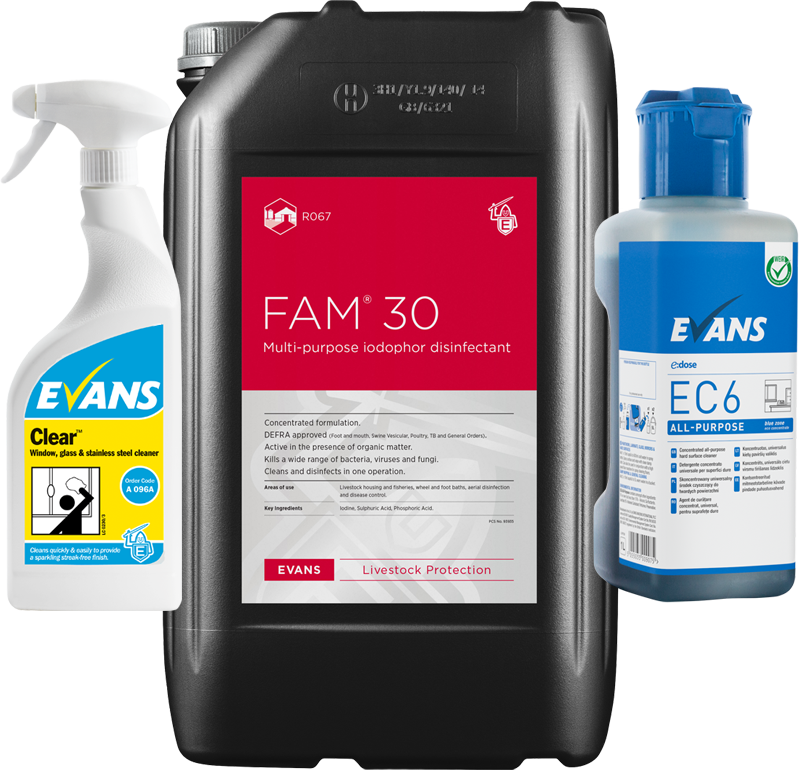Evans was established in 1919 by William Charles Evans in Salford Manchester, The Vanodine name, a mixture of the words 'Evans' and 'iodine', was added to show the importance of iodine based products to our Livestock division. Evans Vanodine is still a family run company based in Preston, in the North West of England.
Yes we manufacture our own chemicals and products in our modern, 100,000 square foot factory. Advanced production facilities involve the use of 10,000 and 14,000 litre stainless steel and heavy duty polyethylene tanks together with multi-head filling lines, complete with automatic capping and labelling machines. These advanced facilities ensure that substantial quantities of products are always in stock.
We sell our product range through a network of national and international distributors. To find the nearest UK stockist, please contact our UK sales office on 01772 318800/1 or e-mail sales@evansvanodine.co.uk
If you are based outside the UK please contact our Export department on +44 (0)1772 322200 or e-mail export@evansvanodine.co.uk
We aim to get your order out to you within 7-10 working days; however, this can fluctuate depending on our volume of orders. To find out more about a particular order, please contact our despatch department on 01772 318814.
Yes, we have several products which have been tested and pass EN 14476 against vaccinia virus, which shows effectiveness against Coronavirus. Please visit our Coronavirus Guideline page for further information HERE.
Yes, our Catering Hygiene, Washroom and Disinfectant ranges include sanitisers that pass EN 1276 (Est-eem, EC4 Sanitiser, EC9 Washroom, Final Touch, Clean Fast, Protect, Odour Neutraliser, Pynol, Safe Zone, Safe Zone Plus and Vanoquat). See individual product pages for dilutions and contact times and Microbiological Profiles.
No, there is no washing up liquid on the market that will kill bacteria at the recommended dilution rate for washing crockery. Products sold as washing-up liquids are detergents designed to remove fatty food residues from the surfaces of food utensils.
There is no legal requirement to use bactericidal washing up liquids in food business premises, though these have been asked for in the past. If disinfection of crockery is required, a chlorine solution (such as Evans Chlor Tabs) may be used for soaking crockery and utensils after cleaning with washing up liquid. For a more detailed explanation, our laboratory has compiled a document which you can download HERE.
Evans Guide to Cross Contamination wallchart is also available via download from our Brochures & Leaflets section HERE or upon request from our Sales office on 01772 318800. Further guidance from The Food Standards Agency (FSA), and document downloads, can be obtained via their website HERE.
Yes, SAFE ZONE PLUS or bleach (Evans Cyclone, Evans Bleach or Evans Chlor Tabs) with a 5 minute contact time can kill Norovirus under clean conditions, i.e. it is important to remove all organic material before disinfection. Although disinfectants based on quaternary ammonium compounds (QACS) have been shown to be ineffective against this virus, SAFE ZONE PLUS, which is based on QAC, has been tested and shown to be effective. Alcohol hand gels have also been shown to be ineffective. The Health Protection Agency (HPA) recommend a concentration of 1000ppm chlorine (1:50 of a 5% Bleach). See the HPA website for guidance HERE.
Yes, Est-eem, Ensure and Vanoquat are all effective. You will find microbiological profiles on each of their product pages. See individual product information sheets for dilutions and contact times.
Yes, Clean Fast, EC4 Sanitiser, EC9 Washroom, Est-eem, Final Touch, Odour Neutraliser, Protect, Pynol, Safe Zone, Safe Zone Plus and Vanoquat have all been tested and found to be effective against E.coli using the European test method EN 1276. See individual products for dilutions and contact times.
Yes. Under clean conditions, i.e. where organic soiling has been removed, SAFE ZONE PLUS is recommended where a 60 minute contact time is possible. Where a shorter contact time is required, bleach (Evans Cyclone or Evans Bleach) is recommended. Health Protection Agency (HPA) Guideline recommends surface disinfection with chlorine based product and reinforcement of hand washing and hand hygiene (alcohol hand gels do not kill spores of Clostridium difficile).
Yes, FAM 30 is an approved disinfectant for use against TB in animals at a rate of 1:20, it is listed on the Defra (Department for Environment and Rural Affairs) website. We do not have products that have been tested against human TB.
No, coccidiosis is a disease caused by protozoan micro-organisms that produce oocysts as part of their life cycle. Sometimes coccidiosis is used as a general term to include cryptosporidiosis.
Cryptosporidia, for example Cryptosporidium baileyi and Cryptosporidium parvum, cause cryptosporidiosis in poultry and calves respectively and Eimeria tenella and Eimeria bovis cause coccidiosis in poultry and calves respectively. The oocysts of Eimeria and Crytosporidia are very resistant to disinfection, with even the strongest farm disinfectants being ineffective.
Yes, we whave a full range of post-milking hygiene products, such as Masofilm, Masodine, Masocare, Four Seasons Masodip and Visqodip. You can find the full range HERE. Our Dairy Hygiene brochure also contains information on the prevention and control of mastitis; you can view and download it via our Brochures section HERE.
Evans Vanodine is committed to developing chemicals which comply with all the relevant European legislation, providing optimum performance with a minimal effect on the environment. We have achieved accreditation by the British Standards Institution under the Environmental Management Standard ISO 14001.
One of our many aims is to reduce the creation of waste in as many situations as possible. To find out more please visit our dedicated environment website: learn more.
Yes and No. We believe the various expressions referring to cleaning & hygiene chemicals such as 'Safe to the Environment' or 'Environmentally Friendly' are contradictions in terms as every chemical has some impact on the environment. Even water can have an adverse effect on the environment.
All our professional hygiene products are analysed through our Green Tick system. The lowest scoring products are given the Green Tick rating, which can be identified by the Green Tick logo.
To find out more about the system and to discover which products are low impact, visit our Greentick site: learn more.
There are many factors to bear in mind when choosing a cleaning product. Often the main points to consider are Where? What? and Why? are you cleaning / disinfecting. If you would like help or advice choosing the right Evans Vanodine product for your task, please do not hesitate to contact our Technical Department on 01772 322200.






